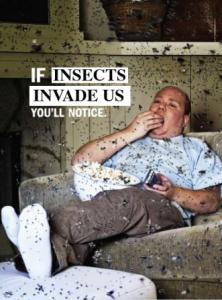 This is a blosh (rehash of someone else’s blog post) of Franck Courchamp‘s posts on an exciting new initiative of which I am excited to be a part. Incidentally, Franck’s spending the week here in Adelaide.
This is a blosh (rehash of someone else’s blog post) of Franck Courchamp‘s posts on an exciting new initiative of which I am excited to be a part. Incidentally, Franck’s spending the week here in Adelaide.
Don’t forgot to vote for the project to receive 50 000 € public-communication grant!
–
Climate change will make winters milder and habitats climatically more suitable year-round for cold-blooded animals like insects, but there are many questions remaining regarding whether such insects will be able to invade other regions as the climate shifts. There are many nasty bugs out there.
For example, the Asian predatory wasp is an invasive hornet in Europe that butchers pollinating insects, especially bees, thereby affecting the production of many wild and cultivated plants. I hope that we all remember what Einstein said about pollinators:
If bees were to disappear, humans will disappear within a few years.
(we all should remember that because it’s one of the few things he said that most of us understood). The highly invasive red fire ant is feared for its impacts on biodiversity, agriculture and cattle breeding, and the thousands of anaphylactic shocks inflicted to people by painful stings every year (with hundreds of deaths). Between the USA and Australia, over US$10 billion is spent yearly on the control of this insect alone. Tiger mosquitoes are vectors of pathogens that cause dengue fever, chikungunya virus and of about 30 other viruses. We could go on.
Most of these nasty creatures are now unable to colonize northern regions of Europe or America, or southern regions of Australia, for example, because they cannot survive cold temperatures. But how will this change? Where, when and which species will invade with rising temperatures? What will be the costs in terms of species loss? In terms of agricultural or forestry loss? In terms of diseases to cattle, domestic animals and humans? What will be the death toll if insects that are vectors of malaria can establish in new, highly populated areas?
We’ve proposed to study these and others from a list of 20 of the worst invasive insect species worldwide, and we got selected (i.e., financed!) by the Fondation BNP Paribas. In addition, the Fondation BNP Paribas has selected five scientific programmes on climate change and will give 50,000 € (that’s US$62,000) to the one selected by the public, for a communication project on their scientific programme. This is why we need you to vote for our project: InvaCost.
InvaCost will look at the impact on invasive insects, when climate change allows them to invade regions that are now too cold for them, but that will warm up in the coming decades. These include the red imported fire ant, the predatory Asian wasp, the disease-carrying tiger mosquito, and many others that are among the worst invaders worldwide.
Our communication project is really different from anything that has been done before, and probably different from the four other contending projects. In addition to building an interactive website to communicate with the public, show and explain our results and answer your questions, we will inaugurate a new type of citizen science, or participatory science: the public will be able to select some of the 20 invasive species that we will study in InvaCost, from a large list we will compile. You will also be able to ask us to do specific analyses, for example “Will Argentine ants be able to invade the UK?” or “Where will the Formosan termite invasion expand in the USA” or “Is the malaria mosquito likely to reach my city and when?”. We will then collect the data, build and run the mathematical models, analyze the outputs and show and explain the results.
Basically, you will chose the subject and the questions, and we will do science for you. The money will be used to design and run the website and to hire staff to interact with the public and make specific analyses during the four years of InvaCost. The communication project is described here.
So if you want to see that happen, it’s simple – vote for our project (now – there are are only 20 hours remaining to vote) by going here. Please forward the message around, we will likely need tens of thousands of votes to be selected. Thanks in advance, we look forward to working with you! Please make sure you select InvaCost!
Franck Courchamp & CJA Bradshaw

